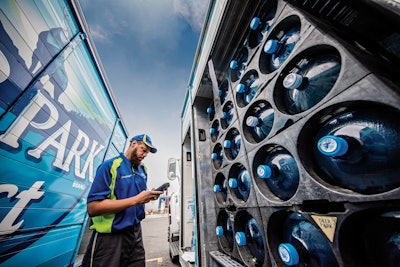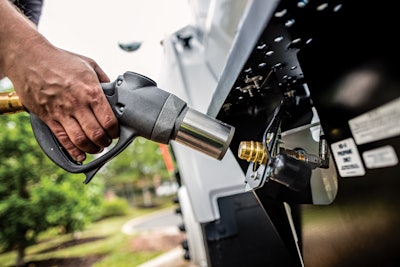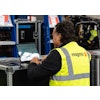
Delivery companies take pride in having a fleet that is as reliable as their business. When working in the food and beverage industry, making a delivery on time can mean the difference between a fresh bounty and spoiled goods. Taking the time to find somewhere to refuel shouldn’t be the reason for a late delivery, and oftentimes finding a refueling system can be a challenge. Regardless of a fleet’s approach to refueling, propane autogas has an answer.
Fleet needs are unique and relative to their overall size and operations philosophy. Propane autogas is a unique fuel that can provide a custom-tailored refueling solution, which is designed to scale while adapting to meet the unique needs of a fleet. Regardless of the size of the fleet, propane autogas provides a fleet with a reliable and proven solution that will maximize its productivity.
Fleet managers can choose from five different refueling solutions. Affordable and scalable refueling is one of the many reasons propane autogas vehicles boast the lowest total cost-of-ownership of any fuel.

Standard Private Station
When it comes to on-site refueling needs, a standard private station is the best option for fleets operating with 50 vehicles or fewer. Standard private stations provide companies with a centralized location, which includes a 1,000- to 3,000-gallon tank with a single autogas fuel dispenser. The dispenser features quick-connect nozzles, which are similar to conventional fuel nozzles in appearance but are securely locked into place during refueling to eliminate spills and evaporative emissions. The nozzles are lightweight, which allow most users to refuel with one hand, and do not require the user to wear protective equipment.
The fleet owner can choose to purchase or lease the infrastructure for a standard private station. If the infrastructure is leased, the propane or infrastructure provider will work with the fleet on setup. The fleet owner is responsible for the site preparation, including installing crash protection and electrical supply. The average cost range for setup is $1,500-$15,000, depending on the site and size of the fleet. If the fleet owner purchases the infrastructure, they assume ownership of the fuel storage tanks, pump, motor and dispenser. The average cost range for the ownership solution is $1,500-$15,000 for site preparation and $20,000-$60,000 for infrastructure.
Advanced Private Station
Much like a standard private station, this option also provides fleets with a centralized refueling station at a location of their choice. However, an advanced private station is best suited for fleets operating 50 or more vehicles. This solution includes one or more high-capacity fuel storage tanks and multiple dispensers. As the fleet grows, the infrastructure can grow with it by adding more dispensers and fuel storage tanks, making this option fully customizable for any fleet. Many advanced private stations also offer an optional overhead canopy for protection from inclement weather.
Fleet owners can choose to lease or purchase the infrastructure. Fleet owners who choose to lease are responsible for the site preparation, including installing crash protection and electrical, which would cost an average of $5,000-$75,000. Fleet owners who choose to purchase their infrastructure pay for the propane fuel storage tanks, pump, motor and dispensers equipped with a fuel data management system, which may include card lock and vehicle tracking capabilities. This setup costs $5,000-$75,000 for site preparations and $60,000-$225,000 for infrastructure.
Mobile Refueling
For fleets who want to take advantage of propane autogas fuel but are uncertain about investing in infrastructure; don’t have the space to build infrastructure; or state or local laws, regulations or codes prohibit installation of infrastructure, mobile refueling is a convenient solution. Propane suppliers will refuel a fleet’s vehicles on-site using a propane bobtail truck. Fleet owners can schedule a routine time for refueling that works around their demanding schedules. With this convenient solution, fleet vehicles are refueled on site, which eliminates all concerns. On-site infrastructure is not required, and fleet owners should contact their propane provider regarding availability and costs.
Temporary Refueling
Some fleets may be in the process of installing permanent infrastructure and need to deploy vehicles prior to completion of the installation. Propane autogas also has a solution for this fleet. Some propane marketers can provide a temporary refueling solution complete with a fuel storage tank and dispenser mounted on a trailer that can be delivered to work sites. This scenario works for both short-term or extended use. Replenishing the fuel storage tank is scheduled with the propane retailer, but like mobile refueling, costs and situations will vary. This is a viable solution for fleets that require refueling while working for long periods on sites located away from the centralized refueling location, such as construction vehicle fleets during a large project.
Public Refueling Network
For fleets that service a wide area or have limited space for refueling, investing in infrastructure may not be feasible. In this case, utilizing a public refueling network can keep fleets on the go no matter where they are in their service area. Public refueling networks provide 24/7 security and convenience. Using a card lock system, the network tracks fuel use and costs per vehicle along a fleet’s route. This option works for fleets of any size. A complete list of public refueling stations is available from the U.S. Alternative Fuels Data Center at afdc.energy.gov/stations.
Finding the right propane autogas refueling solution for your fleet will involve a number of factors, which include available space, fleet size, routes and refueling requirements. But no matter what solution you choose, you’re sure to save money by reducing your overall total cost-of-ownership while maintaining optimum performance for your fleet operations.


















